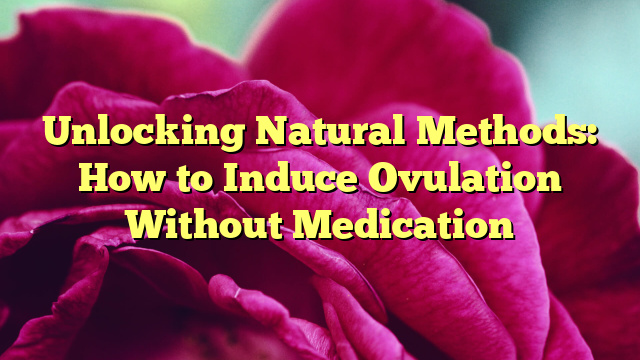Unlocking Natural Methods: How to Induce Ovulation Without Medication
Unlocking Natural Methods: How to Induce Ovulation Without Medication
For many women, the journey to conception is a challenging one, particularly for those experiencing ovulatory issues. While medication is a common recourse, an increasing number of individuals are seeking natural methods to induce ovulation. This article explores various natural approaches to stimulate ovulation, aiming to provide a holistic path towards conception.
Understanding Ovulation
Ovulation is a crucial part of the menstrual cycle, where a mature egg is released from the ovary, making it available for fertilization. For various reasons, some women may experience irregular ovulation or anovulation (lack of ovulation), which can be a significant barrier to conception.
Natural Methods to Induce Ovulation
Adopting natural methods to encourage ovulation can be a gentle and effective approach. Below are several strategies that have been found beneficial.
Dietary Adjustments
What you eat plays a vital role in your reproductive health. Certain dietary adjustments can enhance fertility and promote regular ovulation.
- High-fiber foods: Foods rich in fiber, such as fruits, vegetables, and whole grains, can help balance hormones.
- Lean proteins: Incorporating lean proteins from plant sources can support ovulation.
- Omega-3 fatty acids: Foods high in omega-3s, like salmon and flaxseeds, are beneficial for fertility.
Regular Exercise
Moderate exercise can improve fertility by reducing stress and balancing hormones. However, it’s important to avoid excessive exercise, which can have the opposite effect.
Stress Management
Stress can significantly impact ovulation. Techniques such as yoga, meditation, and deep-breathing exercises can help manage stress levels.
Tracking Ovulation
Understanding your menstrual cycle and identifying your fertile window can naturally increase your chances of conception. Tools like ovulation predictor kits (OPKs) or fertility monitors can be helpful.
Supplements and Herbs
Certain supplements and herbs are believed to support reproductive health and stimulate ovulation.
- Vitex (Chasteberry): This herb may improve hormonal balance and ovulation regularity.
- Myo-inositol: Particularly beneficial for those with PCOS, myo-inositol can help improve ovulation.
- Folic Acid: While known for its role in pregnancy, folic acid can also support ovulation.
Acupuncture
Acupuncture, a key component of traditional Chinese medicine, has been shown to improve fertility by increasing blood flow to the reproductive organs and balancing hormone levels.
Lifestyle Changes
Making specific lifestyle changes can also enhance fertility and promote ovulation.
- Avoiding toxins: Reducing exposure to environmental toxins and chemicals can benefit reproductive health.
- Maintaining a healthy weight: Being either underweight or overweight can affect ovulation. Achieving and maintaining a healthy weight can help regulate ovulation.
- Limiting caffeine and alcohol: Consuming high amounts of caffeine or alcohol can impair fertility. Moderation is key.
When to Seek Professional Help
If you’ve been trying to conceive for over a year (or six months if you’re over 35) without success, it’s advisable to seek professional help. Fertility issues can be complex, and a healthcare provider can offer guidance tailored to your specific situation.
Conclusion
While the journey to conception can be fraught with challenges, exploring natural methods to induce ovulation can be a valuable and empowering step. By making dietary adjustments, managing stress, adopting a healthy lifestyle, and considering supplements and herbs, you can support your reproductive health and increase your chances of conceiving naturally. Remember, it’s important to consult with a healthcare provider before making significant changes, especially if you have underlying health conditions.
References
| Source | Key Findings |
|---|---|
| Journal of Reproductive Medicine | Identifies dietary fiber’s role in balancing reproductive hormones. |
| Fertility and Sterility | Discusses the impact of moderate exercise on fertility. |
| Journal of Alternative and Complementary Medicine | Explores the benefits of acupuncture in improving fertility. |
Note: This article is for informational purposes only and does not constitute medical advice. It’s always best to consult with a healthcare professional for personalized guidance.

